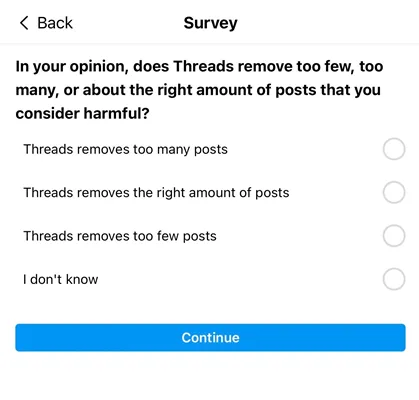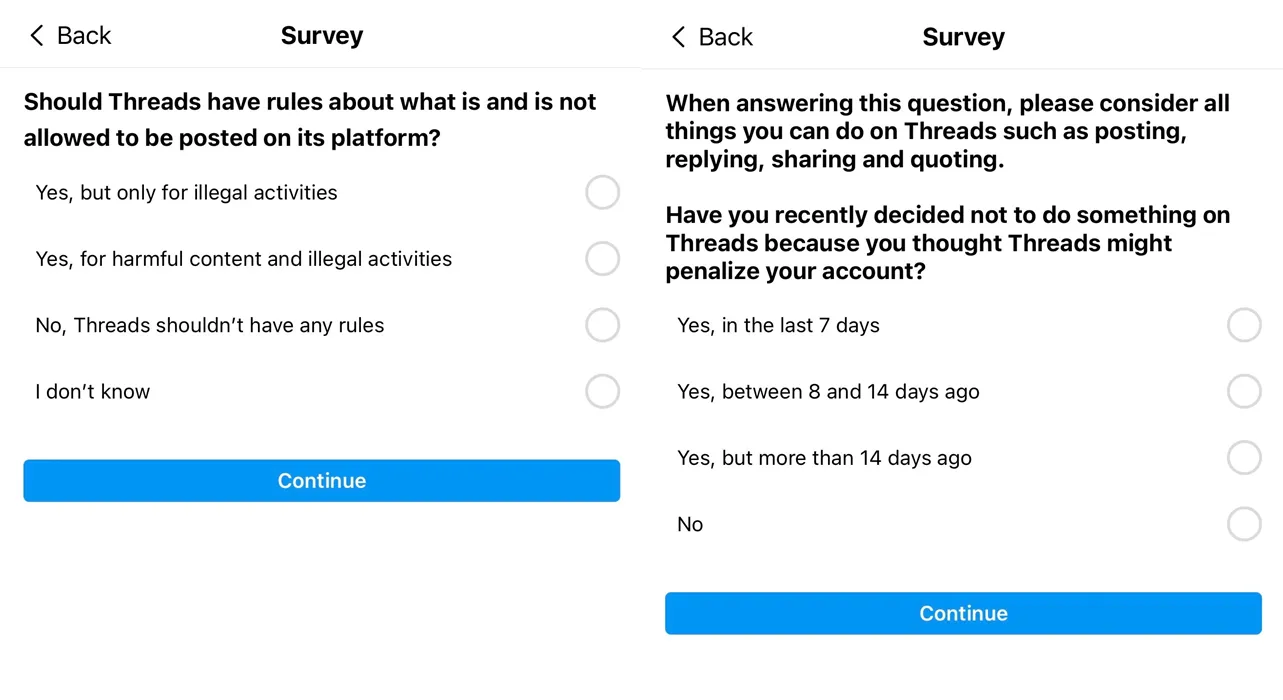Threads Surveys User Opinions on Political Content Restrictions

Oh, what a surprise, now that the U.S. election has passed, Meta is re-thinking its approach to political content on Threads.
Well, not political content specifically, but over the past week, some Threads users have been prompted to take part in a new survey related to content moderation in the app, and whether Threads should allow more or less topical discussion.

As you can see, the survey, which some users have been prompted to complete in-stream, asks questions about whether Threads removes too many posts, and how that impacts your perception and usage of the app.
There are also questions about Threads’ moderation and posting rules, and how users feel about posting in the app.

The “only for illegal activities” response echoes Elon Musk’s stated approach at X, with Musk repeatedly noting that X won’t remove content unless it breaks the law in a given region. Which X hasn’t always stuck to, but conceptually, this aligns with X’s freedom of speech approach, which would allow anybody to post anything, within legal guard rails.
And many believe that Threads should align with the same, and stop restricting political content, in particular, in order to ensure that it can provide a full, real-time stream of the latest news and discussions at any moment.
Because during the U.S. Election, many found that Threads’ political content restrictions limited its viability as a real-time info provider. That’s always been the key strength of Twitter (now X), that when something is happening in the moment, you can tap into X for the latest feed of posts related to that event. The fact that Threads was so bad on this front, especially on Election Day, is what led many to Bluesky instead, and Threads is pretty clearly concerned about the threat that Bluesky now poses to its ongoing growth.
Which is why it’s now re-thinking this. Though, really, it’s always seemed like Meta would re-assess this after the Presidential vote.
Meta has long been concerned about how it’s perceived in regards to political influence, especially after the 2016 election, when it got blamed for enabling the spread of propaganda and misinformation, which eventually led to the election of Donald Trump. Whether those influence campaigns were designed to get Trump elected, or indeed, had any real effect, is unclear, but either way, the perception of such led to Meta CEO Mark Zuckerberg being hauled before congress, and impacted Meta’s broader brand perception.
That’s potentially one of the reasons why it changed its company name to Meta in 2021, in order to distance itself from negative association, while it’s also rolled out a range of election integrity and misinformation detection measures to ensure that its on top of such in future.
Though even then, it still got dragged into the political blame game around the Capitol riots in 2021, and since then, it’s been looking to move away from political news entirely, and further separate itself from the issues that it can cause.
All of this, however, was really designed with the 2024 election in mind, knowing that it would once again be a divisive poll, and that its platforms could play a role in amplifying such.
But with the election now passed, with relatively little angst, Meta’s looking to revise this approach, with Threads specifically set to get a revision of its rules around political content.
And it does need it. If Meta genuinely wants to challenge X, then the trending news of the day, whenever Trump announces some new, controversial policy, can’t be some light hearted headlines about baby pandas in a zoo. Threads needs to also serve broader news needs, and ensure that it keeps users informed, in real-time.
And while Meta doesn’t want Threads to replicate what Twitter was, as such, with Zuck and Co. seeking to build a more friendly version of a real time platform, if Threads is going to succeed, it needs a less filtered flow of the latest posts.
Threads is asking the question now, and I suspect that the responses will drive this next shift.
Source link




